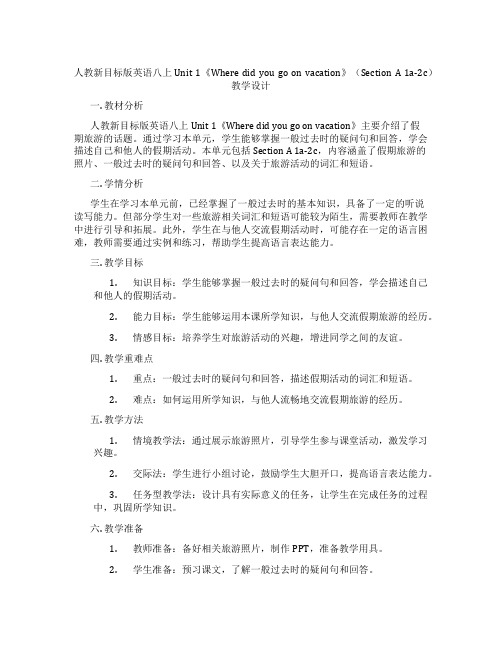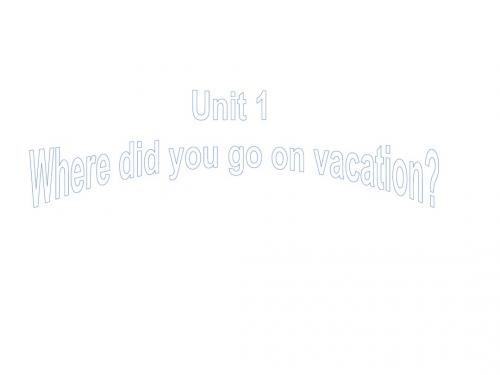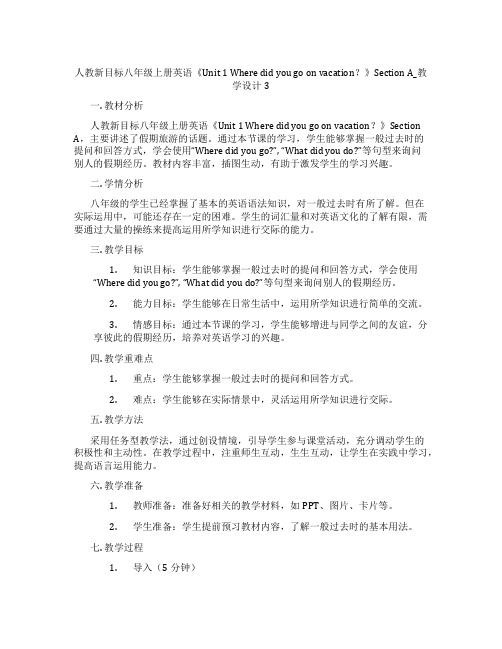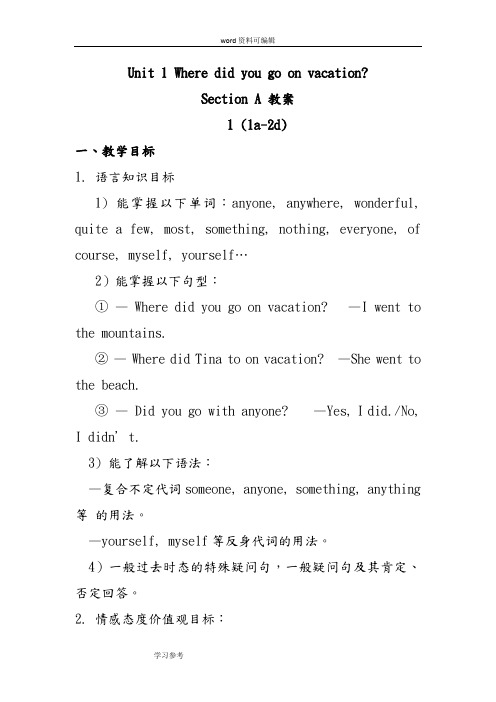2013新人教版八年级上册Unit 1 Where did you go on vacation Section B
人教新目标版英语八上Unit 1《Where did you go on vacation》(Sec

人教新目标版英语八上Unit 1《Where did you go on vacation》(Section A 1a-2c)教学设计一. 教材分析人教新目标版英语八上Unit 1《Where did you go on vacation》主要介绍了假期旅游的话题。
通过学习本单元,学生能够掌握一般过去时的疑问句和回答,学会描述自己和他人的假期活动。
本单元包括Section A 1a-2c,内容涵盖了假期旅游的照片、一般过去时的疑问句和回答、以及关于旅游活动的词汇和短语。
二. 学情分析学生在学习本单元前,已经掌握了一般过去时的基本知识,具备了一定的听说读写能力。
但部分学生对一些旅游相关词汇和短语可能较为陌生,需要教师在教学中进行引导和拓展。
此外,学生在与他人交流假期活动时,可能存在一定的语言困难,教师需要通过实例和练习,帮助学生提高语言表达能力。
三. 教学目标1.知识目标:学生能够掌握一般过去时的疑问句和回答,学会描述自己和他人的假期活动。
2.能力目标:学生能够运用本课所学知识,与他人交流假期旅游的经历。
3.情感目标:培养学生对旅游活动的兴趣,增进同学之间的友谊。
四. 教学重难点1.重点:一般过去时的疑问句和回答,描述假期活动的词汇和短语。
2.难点:如何运用所学知识,与他人流畅地交流假期旅游的经历。
五. 教学方法1.情境教学法:通过展示旅游照片,引导学生参与课堂活动,激发学习兴趣。
2.交际法:学生进行小组讨论,鼓励学生大胆开口,提高语言表达能力。
3.任务型教学法:设计具有实际意义的任务,让学生在完成任务的过程中,巩固所学知识。
六. 教学准备1.教师准备:备好相关旅游照片,制作PPT,准备教学用具。
2.学生准备:预习课文,了解一般过去时的疑问句和回答。
七. 教学过程1.导入(5分钟)教师展示旅游照片,引导学生谈论假期旅游的经历,激发学生对本课内容的兴趣。
2.呈现(10分钟)教师通过PPT展示课文1a-1c的内容,引导学生跟读,注意语音语调。
2013年八年级英语上册-Unit-1-Where-did-you-go-on-vacation-Section-A-3a-3c.

他自己 她自己 它自己
ourselves yourselves
themselves
我们自己 你们自己
他们自己
1. Did you buy anything for yourself? 你为你自己买什么东西了吗?(做介词宾语) 2. The old man taught himself English. 那位老人自学英语。(做动词宾语)
1. 你去了什么地方去度假? _W__h_e_r_e __d__id__ you go on _v_a_c_a_t_io_n__? 2. 我去了纽约市。 I _w_e_n_t___ _t_o__ New York City. 3. 你和别的什么人一起去的吗? _D_i_d___ _y_o_u___ go out with _a_n_y_o_n_e__?
( ) 1. I’m hungry. I want ___B___ to eat. A. anything B. something
C. everything D. nothing
( ) 2. —Do you have __D____ to say for yourself?
—No, I have ______ to say.
smell: 闻起来 ~ sweet
look:看起来 ~ beautiful/handsome/cute
sound: 听起来 ~ good/wonderful feel:摸起来 ~cold/warm/soft(软)
感官动词(系动词)+ 形容词
2.have a good time: 玩的开心、过得愉快
问题是李雪鹏没有钱。
The problem is that Li Xuepeng has no money. 唯一的问题是今天的报纸上没有什么有趣的东西。
英语人教版八年级上册Unit1 Where did you go

1.呈现动画,并让学生模仿配音2c,2d的会话,激发学生的表现欲和学习兴趣。关注情感,让学生小组讨论。
2.小组展示:1人为记者,采访其他人的生活活动。
1.模仿并配音,学会合作,共同提高,要关心他人,提出合理化建议。
2.积极参与,踊跃发言,争创学习明星小组。
用动画效果,加深学生的印象,提高学习效率和学习效果,调动学生的参与性。
教学设计
教学主题
八年级Unit 1 Where did you g为一体,注重学生的参与性,活动多、教学环节也相对较多。本课是Unit1的第一课时,是听说课,在本单元中具有具足轻重的作用。通过对本课的学习,学生能够交流关于旅游、度假、锻炼、学习等活动,并能够对各项活动发表自己的观点。
Leading-in
呈现1a中的图片,让学生根据图片信息说出6个weekend activities,引入本课主题Where did you go on vacation?
根据图片内容,小组内Free Talk。
用PPT展示1a的图片,呈现标题Where did you go onvacation?用红色字体重点标注生词和动词短语
在Listening的环节上,我们做了新的尝试。由于听力任务设置很分散,内容和任务相对简单,考虑到小组合作学习的优势,我们充分发挥了思维导图的灵活性和记忆链接功能,将三个听力任务合并成一个,并且在完成课本的听力任务之后,就让学生在小组内进行了Free Talk,进一步提高了学生综合运用语言的能力。
我们利用网络资源,借助多媒体,把PPT和思维导图结合运用,利用电子白板的交互作用,充分发挥了师生的互动功能,调动了学生的积极性。
四、教学环境
√简易多媒体教学环境√交互式多媒体教学环境√网络多媒体环境教学环境□移动学习□其他
2013新人教版八年级上册Unit_1_Where_did_you_go_on_vacation_Section_B

n. 雨伞
潮湿的 因为
We were all wet because we didn’t take
an umbrella. We were all wet because of the rain.
10. below
在。。下面adv. prep.
There is much grass below the wall.
n. 差别
adv.
There are two differences between us.
7. top
n. 顶部
We climbed up to the top of the
mountains.
8. wait v. 等待
He is waiting for me now.
9. umbrella
wet adj. because of
How were the hamburgers? Practice They were delicious.
Practice
How were the apples? They were awful.
Practice was the bus? How
It was crowded.
Practice
a e cheap 2. ___expensive 4. ___
d 6. ___boring
1b
words and
words.
words
words
delicious terrible cheap expensive exciting boring
Practice
How was the hamburger? It was delicious.
Where did … go on vacation? How was/were the…?
人教新目标八年级上册英语《Unit 1 Where did you go on vacation?》

人教新目标八年级上册英语《Unit 1 Where did you go on vacation?》Section A_教学设计3一. 教材分析人教新目标八年级上册英语《Unit 1 Where did you go on vacation?》Section A,主要讲述了假期旅游的话题。
通过本节课的学习,学生能够掌握一般过去时的提问和回答方式,学会使用“Where did you go?”, “What did you do?”等句型来询问别人的假期经历。
教材内容丰富,插图生动,有助于激发学生的学习兴趣。
二. 学情分析八年级的学生已经掌握了基本的英语语法知识,对一般过去时有所了解。
但在实际运用中,可能还存在一定的困难。
学生的词汇量和对英语文化的了解有限,需要通过大量的操练来提高运用所学知识进行交际的能力。
三. 教学目标1.知识目标:学生能够掌握一般过去时的提问和回答方式,学会使用“Where did you go?”, “What did you do?”等句型来询问别人的假期经历。
2.能力目标:学生能够在日常生活中,运用所学知识进行简单的交流。
3.情感目标:通过本节课的学习,学生能够增进与同学之间的友谊,分享彼此的假期经历,培养对英语学习的兴趣。
四. 教学重难点1.重点:学生能够掌握一般过去时的提问和回答方式。
2.难点:学生能够在实际情景中,灵活运用所学知识进行交际。
五. 教学方法采用任务型教学法,通过创设情境,引导学生参与课堂活动,充分调动学生的积极性和主动性。
在教学过程中,注重师生互动,生生互动,让学生在实践中学习,提高语言运用能力。
六. 教学准备1.教师准备:准备好相关的教学材料,如PPT、图片、卡片等。
2.学生准备:学生提前预习教材内容,了解一般过去时的基本用法。
七. 教学过程1.导入(5分钟)通过展示一些假期旅游景点的图片,引导学生谈论自己的假期经历,引出本节课的主题。
2.呈现(5分钟)教师通过PPT展示本节课的主要句型:“Where did you go?”, “What did you do?”等,同时给出相应的回答,让学生感知和理解这些句型的用法。
2013新人教版八年级上册英语UNIT1讲义

Unit1 Where did you go on vacation?一、重点短语go on vacation去度假stay at home待在家里go to the mountains去爬山go to the beach去海滩visit museums 参观博物馆go to summer camp去参观夏令营quite a few相当多study for为……而学习go out出去most of the time大部分时间taste good尝起来很好吃have a good time玩得高兴of course当然feel like给……的感觉;感受到go shopping去购物in the past在过去walk around四处走走because of因为one bowl of… 一碗…… the next day第二天drink tea喝茶find out找出;查明go on 继续something important重要的事up and down上上下下come up出来take photos照相二、句型集萃buy sth、for sb、/ buy sb、sth、为某人买某物taste + adj、尝起来……seem+(to be)+ adj、瞧起来……keep doing sth、继续做某事arrive in+大地点/ arrive at+小地点到达某地tell sb、(not) to do sth、告诉某人(不要)做某事try doing sth、尝试做某事/ try to do sth、尽力去做某事decide to do sth、决定去做某事forget doing sth、忘记做过某事/ forget to do sth、忘记做某事enjoy doing sth、喜欢做某事want to do sth、想去做某事stop doing sth、停止做某事dislike doing sth、不喜欢做某事Why not do、sth、?为什么不做……呢?so+adj、+that 如此……以至于……look+adj、瞧起来……start doing sth、开始做某事三、单元重点、难点、考点精讲(一)Section A1、Where did you go on vacation? 您去哪里度假了?(P1)1)这就是有疑问副词where引导的特殊疑问句,where用来询问地点与场所,放在句首。
人教新目标八年级上册英语《Unit 1 Where did you go on vacation?》

人教新目标八年级上册英语《Unit 1 Where did you go on vacation?》Section A_教学设计1一. 教材分析人教新目标八年级上册英语《Unit 1 Where did you go on vacation?》Section A,主要介绍了假期旅游的话题。
本节课通过引入旅游的话题,让学生学习一般过去时态的疑问句和回答。
教材内容丰富,插图生动有趣,有利于激发学生的学习兴趣。
本节课的主要语言点是一般过去时态的疑问句和回答,以及相关的旅游词汇。
二. 学情分析八年级的学生已经学习了英语一段时间,对英语有了一定的了解和掌握。
他们好奇心强,喜欢探索新事物,但同时也有可能对英语学习产生疲劳感。
因此,在教学过程中,需要充分调动学生的积极性,激发他们的学习兴趣。
学生的英语水平参差不齐,因此需要针对不同水平的学生进行分层教学。
三. 教学目标1.知识目标:学生能够掌握一般过去时态的疑问句和回答,以及相关的旅游词汇。
2.能力目标:学生能够用英语询问和描述假期旅游的经历。
3.情感目标:通过本节课的学习,学生能够培养对旅游的兴趣,增强对英语学习的热情。
四. 教学重难点1.重点:一般过去时态的疑问句和回答,以及相关的旅游词汇。
2.难点:一般过去时态的疑问句和回答的运用,以及旅游词汇的准确表达。
五. 教学方法1.任务型教学法:通过设定各种旅游相关的任务,让学生在完成任务的过程中学习和运用语言。
2.情境教学法:创设各种旅游情境,让学生在真实的情境中学习英语。
3.小组合作学习:通过小组讨论和合作,提高学生的参与度和积极性。
六. 教学准备1.教师准备:提前准备相关的旅游图片、视频和旅游经历的故事,以及旅游词汇的卡片。
2.学生准备:学生需要提前预习教材,了解本节课的学习内容。
七. 教学过程1.导入(5分钟)通过向学生展示各种旅游图片,引导学生谈论自己的旅游经历,激发学生的学习兴趣。
教师可以提问:“Where did you go on vacation?”,让学生用英语回答。
人教新目标八年级上册英语《Unit 1 Where did you go on vacation?》

人教新目标八年级上册英语《Unit 1 Where did you go on vacation?》Section B_教学设计1一. 教材分析人教新目标八年级上册英语《Unit 1 Where did you go on vacation?》Section B 主要讲述了假期旅行的主题。
通过本节课的学习,学生能够掌握一般过去时的疑问句和回答,以及如何描述过去发生的事情。
教材内容贴近学生的生活,激发学生对旅行的兴趣,提高学生的口头表达能力。
二. 学情分析八年级的学生已经掌握了基本的英语语法知识,具有一般现在时和一般过去时的基础。
在学习本节课之前,学生已经学习了如何用英语描述家庭成员和询问他们的去向。
因此,学生在学习本节课时,能够将已有的知识与新的知识相结合,提高学习效果。
三. 教学目标1.知识目标:–能够听懂、说出一般过去时的疑问句和回答。
–能够用英语描述过去发生的事情。
2.能力目标:–能够与他人用英语交流关于假期旅行的经历。
–能够提高口头表达能力。
3.情感目标:–激发学生对旅行的兴趣,拓宽视野。
–培养学生的团队协作精神。
四. 教学重难点•一般过去时的疑问句和回答。
•如何用英语描述过去发生的事情。
•一般过去时疑问句的构成和用法。
•如何在实际交流中运用一般过去时。
五. 教学方法1.情境教学法:通过设置旅行相关的情境,让学生在实际语境中学习英语。
2.交际法:鼓励学生参与课堂互动,提高学生的口头表达能力。
3.任务型教学法:通过小组合作完成任务,培养学生的团队协作精神。
六. 教学准备1.教学课件:制作与旅行相关的课件,包括图片、视频等。
2.教学道具:准备一些与旅行相关的实物道具,如地图、行李箱等。
3.小组活动准备:划分学习小组,提前分配任务。
七. 教学过程1.导入(5分钟)–教师展示一张旅行图片,引导学生谈论旅行的话题。
–学生分享自己最喜欢的旅行地点和经历。
2.呈现(10分钟)–教师通过课件呈现一般过去时的疑问句和回答。
人教版英语八年级上册全册教材全解:人教版英语八年级上册 Unit 1 Where did you go on vacation教材全解

人教版英语八年级上册Unit 1 Where did you go on vacation?教材全解【教材内容解析】Section A1.Where did you go on vacation? (P. 1)on vacation意为“在度假”,结构“on+名词”表示“在某种状态中”。
My family went to Hainan on vacation last year.2....visited my uncle (P. 1)visit此处用作及物动词,后接人或物做宾语,意为“拜访、看望”,后接表示地点的名词,意为“参观、游览”。
I visited my grandmother last week.Do you want to visit Shanghai?3....go with anyone? (P. 2)(1)anyone用作不定代词,意为“有人、任何人”,相当于anybody,用于疑问句和否定句中,在肯定句中用someone或者somebody。
但是anyone也可以用在肯定句中,表示“任何一个人”。
Did you meet anyone friendly in that city?Anyone can be helpful in some way.(2)anyone只能指人,不可以指物,后面不接of短语;any one既可以指人也可以指物,后可接of短语。
Anyone in my class knows any one of the singers and any one of their sons.4....buy anything special? (P. 2)(1)buy用作双宾语动词,表示“买”,常用的结构为“buy sb. sth.”或者“buy sth. for sb.”,表示“为某人买某物”。
My father bought me a bike.=My father bought a bike for me.【拓展】可接双宾语的动词还有give, bring, show, tell, sell等。
人教新目标八年级上册英语《Unit 1 Where did you go on vacation?》

人教新目标八年级上册英语《Unit 1 Where did you go on vacation?》Section B_教学设计2一. 教材分析人教新目标八年级上册英语《Unit 1 Where did you go on vacation?》Section B 主要包括两部分内容:一是听力练习,二是口语交际。
通过本节课的学习,学生能够掌握一般过去时的疑问句和回答,学会用英语询问他人的假期经历,并能用一般过去时进行回答。
教材内容丰富,贴近学生生活,有利于激发学生的学习兴趣。
二. 学情分析八年级的学生已经掌握了部分英语语法知识,具备一定的听说读写能力。
但学生在使用一般过去时方面还存在困难,需要通过大量的练习来巩固。
此外,学生对于描述自己和他人的假期经历可能感到无从下手,需要教师在课堂上进行引导和鼓励。
三. 教学目标1.知识目标:学生能够掌握一般过去时的疑问句和回答,学会用英语询问他人的假期经历,并能用一般过去时进行回答。
2.能力目标:学生能够听懂、会说、会写本节课的重点词汇和句型。
3.情感目标:通过本节课的学习,学生能够增进与同学之间的友谊,分享彼此的假期经历。
四. 教学重难点1.重点:一般过去时的疑问句和回答,以及本节课的重点词汇和句型。
2.难点:如何运用一般过去时描述自己和他人的假期经历。
五. 教学方法1.任务型教学法:通过设置各种任务,让学生在完成任务的过程中学会运用所学知识。
2.交际法:鼓励学生进行口语交流,提高学生的交际能力。
3.情境教学法:创设各种情境,让学生在真实的环境中学会使用英语。
六. 教学准备1.教师准备:准备好课件、听力材料、相关图片等教学资源。
2.学生准备:预习本节课的内容,准备好相关的词汇和句型。
七. 教学过程1.导入(5分钟)教师通过提问学生“What did you do last weekend?”引出本节课的主题“假期经历”。
引导学生用英语表达自己的假期经历,激发学生的学习兴趣。
人教新目标八年级上册英语《Unit 1 Where did you go on vacation?》

人教新目标八年级上册英语《Unit 1 Where did you go on vacation?》Section A_教学设计2一. 教材分析人教新目标八年级上册英语《Unit 1 Where did you go on vacation?》Section A,主要讲述了假期旅游的话题。
本节课通过引入 vacation 这一主题,让学生学会询问他人假期去哪里旅游以及如何描述自己的假期经历。
教材内容丰富,插图生动,有助于激发学生的学习兴趣,提高他们的语言运用能力。
二. 学情分析八年级的学生已经掌握了基本的英语语法和词汇,具备一定的听说读写能力。
但他们在实际运用英语进行交流时,还存在着一定的困难。
因此,在教学过程中,教师需要关注学生的个体差异,创设真实、有趣的语言环境,让他们在实践中提高英语水平。
三. 教学目标1.知识目标:让学生掌握 vacation 相关词汇,学会询问他人假期去哪里旅游以及如何描述自己的假期经历。
2.能力目标:提高学生的听说读写能力,使他们能够在实际情境中运用英语进行交流。
3.情感目标:培养学生对旅游的兴趣,增强他们的生活体验。
四. 教学重难点1.重点:掌握 vacation 相关词汇,学会询问他人假期去哪里旅游以及如何描述自己的假期经历。
2.难点:运用英语进行实际交流,提高语言运用能力。
五. 教学方法1.任务型教学法:通过完成各种任务,让学生在实践中学习英语,提高他们的语言运用能力。
2.情境教学法:创设真实、有趣的语言环境,激发学生的学习兴趣。
3.交际教学法:鼓励学生积极参与课堂交流,提高他们的听说能力。
六. 教学准备1.准备相关旅游图片、视频等教学资源。
2.设计各种任务,如小组讨论、角色扮演等。
3.准备听力材料,让学生练习听力。
七. 教学过程1.导入(5分钟)利用图片、视频等教学资源,引入 vacation 这一主题,激发学生的学习兴趣。
2.呈现(5分钟)展示 vacation 相关词汇,如 beach, mountn, temple 等,并解释它们的意思。
新人教版八年级上册英语单词表全(可打印)[终稿]
![新人教版八年级上册英语单词表全(可打印)[终稿]](https://img.taocdn.com/s3/m/765b9a367f1922791788e835.png)
2013新人教版八年级上册英语单词表Unit1 Where did you go on vacation? anyone ['eniwʌanywhere ['eniweə(r)] adv.任何地方n.任何(一个)地方wonderful ['wʌndəfl] adj.精彩的;极好的few [fjuːmost [məʊst] adj.最多的;大多数的;something ['sʌmθɪŋ] pron.某事物;nothing(=not…anything) ['nʌθɪmyself [maɪeveryone ['evriwʌn] pron.每人;人人yourself [jɔː'self] pron.你自己;你亲自hen [hen] n.母鸡;雌禽bored [bɔːd] adj.无聊的;厌烦的;郁闷的diary ['daɪəri] n.日记;日记簿(keep a diary)seem [siːm] vi.似乎;好像someone ['sʌmwʌn] pron.某人;有人quite a few相当多;不少(后接可数名词)of course [əvkɔːs] 当然activity [æk'tɪvəti] n.活动;活跃decide [dɪ'saɪd] v.决定;选定(decide to do sth.)try [traɪ] v.尝试;设法;努力(try to do sth. /try doing sth.) bird [bɜːd] n.鸟;禽paragliding ['pærəɡlaɪdɪbicycle ['baɪsɪbuilding ['bɪldɪtrader ['treɪdə(r)] n.商人;商船wonder ['wʌndə(r)] v.惊奇;想知道;怀疑difference ['dɪfrəns] n.差异;不同top [tɒp] n.顶部;顶wait [weɪt] v.等;等待(wait for)umbrella [ʌm'brelə] n.伞;雨伞wet [wet] adj.湿的;雨天的below [bɪ'ləʊas [əz] conj.如同;像...一样duck [dʌk] n.鸭肉;鸭Unit2 How often do you exercise? housework ['haʊswɜːhardly ['hɑːdli] adv.几乎不;简直不;刚刚ever ['evə(r)] adv.曾经;在任何时候once [wʌns] adv.一次;曾经twice [twaɪs] adv.两倍;两次program ['prəʊɡræm] n.节目;程序;课程;节目单full [fʊl] adj.满的;充满的;完全的swing [swɪŋ] n.摇摆;秋千v.摇摆;旋转maybe ['meɪbi] adv.或许;也许;可能least [liːst] adj.最小的;最少的at least至少junk n.垃圾;废旧杂物health [helθ] n.健康;人的身体或精神状态result [rɪ'zʌlt] .结果;后果online [ˌɒn'laɪalthough [ɔːl'ðəʊ] conj.虽然;尽管;然而;可是through [θruː] prep.穿过;凭借;一直到body ['bɒmind [maɪnd] .头脑;想法;意见;心思such [sʌtʃ] adj.这样的;如此的together [tə'ɡeðə(r)] adv.;一起die [daɪ] v.死;writer ['raɪtə(r)] n.作者;almost ['ɔːlməʊst] adv.几乎;none [nʌless [les] adj.更少的;point [pɔɪnt] n.看法;Unit3 I'm more outgoing than my sister. outgoing ['aʊtɡəʊɪwin [wɪserious ['sɪmirror ['mɪshould [ʃtouch [tʌtʃreach [riːtʃheart [hɑːlaugh [lɑːshare [ʃloud [laʊUnit4 What's the best movie theater? theater ['θɪcomfortable ['kʌseat [siːt] n.座位;screen [skriːclose [kləʊs] v.关;worst [wɜːcheaply ['tʃiːsong [sɒchoose [tʃuːreporter [rɪ'pɔːfresh [freʃworse [wɜːservice ['sɜːvɪmenu ['menjuːact [ækt] v.行动;表演meal [miːcreative [kri'eɪtɪperformer [pə'fɔːtalent ['tælənt] n.才能;common ['kɒmagician [mə'dʒɪʃbeautifully ['bjuːtɪfli] adv.完美地;role [rəʊwinner ['wɪprize [praɪeverybody ['evribɒexample [ɪɡ'zɑːpoor [pɔːseriously ['sɪəriəsli] 严重地give [ɡɪv] v.给;赠予;送crowded ['kraʊdɪmakeup编造for example例如Unit5 Do you want to watch a game show? sitcom ['sɪtkɒm] n.情景喜剧(= situation comedy)news [njuːz] n.新闻;消息soap [səʊp] n.肥皂;肥皂剧educational [ˌedʒu'keɪʃənl] adj.教育的;有教育意义的plan [plæn] n.计划;方法v.打算;计划hope [həʊdiscussion [dɪ'skʌʃn] n.讨论;谈论stand [stænd] v.站立;忍受happen ['hæpən] vi.发生;碰巧;出现;偶遇may [meɪ] aux.可以,能够;可能,也许expect [ɪk'spekt] v.预期;期待;盼望joke [dʒəʊk] n.笑话;玩笑v.说笑话;开玩笑comedy ['kɒmədi] n.喜剧;滑稽;幽默事件find out查明、弄清meaningless ['miːnɪŋləs] adj.无意义的;不重要的action ['ækʃn] n.行为;活动cartoon [kɑː'tuːn] n.卡通;漫画culture ['kʌltʃə(r)] n.栽培;文化;教养famous ['feɪməs] adj.著名的;有名的appear [ə'pɪə(r)] vi.出现;出版;显得become [bɪ'kʌm] v.变成;成为rich [rɪtʃ] adj.富有的;富饶的;丰富的successful [sək'sesfl] adj.成功的;圆满的might [maɪt] aux.可能;也许;may的过去式main [meɪn] adj.主要的;最重要的reason ['riːzn] n.原因;理由film [fɪunlucky [ʌn'lʌki] adj.倒霉的;不幸的;不吉利的lose [luːready ['redi] adj.准备好的;乐意的character ['kærəktə(r)] n.个性;品质;人物;simple ['sɪmpl] adj.简单的;朴素的;单纯的;笨的army ['ɑːmi] n.军队;陆军;一大批action movie动作片be ready to愿意迅速做某事dress up装扮;乔装打扮take sb.’s place代替;替换do a good job工作干得好;做得好Unit6 I'm going to study computer science. doctor ['dɒktə(r)]医生engineer [endʒɪ'nɪr] 工程师violinist [ˌvaɪə'lɪnɪst]小提琴手pilot ['paɪlət] 飞行员pianist ['pɪənɪst] 钢琴家scientist['saɪəntɪst]科学家college ['kɑːlɪdʒ] 大学education [ˌedʒu'keɪʃn] 教育medicine ['medsn]药,医学university [ˌjuːnɪ'vɜːrsəti] 大学,高等学府article ['ɑːrtɪkl]文章,论文send [send] 邮寄,发送grow up 长大成长computer programmer 计算机管理员be sure about 确信make sure 确保resolution [ˌrezə'luːʃn] 决心,决定foreign ['fɔːrən] 外国的able [ˈebəl] 能够discuss [dɪˈskʌs] 讨论,商量promise [ˈprɑmɪs] 承诺,诺言beginning [bɪˈɡɪnɪŋ] 开头,开端improve [ɪmˈpruv] 改进,改善physical ['fɪzɪkl]身体的selfimprovement [selfɪmp'ruːvmənt]自我改进,自我提高hobby ['hɑːbi] 业余爱好own [oʊn] 自己的,本人的,拥有personal ['pɜːrsənl]个人的,私人的relationship [rɪ'leɪʃnʃɪp] 关系write down 写下have to do with关于;与……有关系take up学着做;开始做agree with 同意be able to 能够做某事Unit 7 Will people have robots? paper['peɪpər] 纸pollution [pə'luːʃn] 污染;污染物prediction[prɪ'dɪkʃn]预测future ['fjuːtʃər] 未来pollute[pə'luːt] 污染environment [ɪn'vaɪrənmənt] 环境planet ['plænɪt] 行星earth[ɜːrθ] n.地球;泥土plant [plænt] 种植,植物part [pɑːrt] 参加,部分peace [piːs]和平sky[skaɪ] 天空play a part 参与astronaut['æstrənɔːt] 宇航员apartment[ə'pɑːrtmənt] 公寓房间rocket ['rɑːkɪt] 火箭;space[speɪs] .空间;太空even['iːvn] 甚至;愈加hum an ['hjuːmən] 人的;n.人;人类servant['sɜːrvənt] 仆人dangerous ['deɪndʒərəs] 危险的already[ɔːl'redi]已经factory['fæktri] 工厂believe [bɪ'liːv] 相信disagree [ˌdɪsə'ɡriː]不同意shape [ʃeɪp] 形状fall [fɔːl] 倒塌;跌倒possible ['pɑːsəbl] 可能的probably ['prɑːbəbli] 大概;或许;很可能holiday ['hɑːlədeɪ] 假日word[wɜːrd] 单词;space station 太空站over and over again 多次;反复地hundreds of 许多;大量;成百上千fall down 突然倒下;跌倒;倒塌look for 寻找;寻求Unit 8 How do you make a banana milk shake? blender['blendər] 搅拌器;果汁机peel[piːl] vt.剥落;削皮pour [pɔːr] pour[pɔːr] 倒;倾倒yogurt['joʊɡərt] 酸奶;honey ['hʌni]蜂蜜watermelon ['wɔːtərmelən]西瓜spoon [spuːn] 勺,调羹add[æd] 增加finally['faɪnəli] 最后,最终salt[sɔːlt] 盐sugar['ʃʊɡər] 糖cheese[tʃiːz] 干酪,奶酪popcorn ['pɑːpkɔːrn] 爆米花corn [kɔːrn] 玉米,谷物machine[mə'ʃiːn] 机器sandwich['sænwɪtʃ] 三明治butter['bʌtər] 黄油,奶油turkey ['tɜːrki]火鸡lettuce ['letɪs] 莴苣,生菜piece[piːs] 件;篇;片;块;traditional [trə'dɪʃənl] 传统的traveler ['trævlə] 旅行者England['ɪŋɡlənd] 英格兰;英国celebrate['selɪbreɪt] 庆祝;庆贺pepper ['pepər] 胡椒粉;辣椒oven['ʌvn] 烤箱;烤炉cover['kʌvər] 遮盖,盖子,gravy['ɡreɪvi] 肉汁;肉汤serve[sɜːrv] 接待,服务temperature ['temprətʃər] 温度,气候Unit 9 Can you come to my party? prepare [prɪ'per]v.预备;准备exam[ɪɡ'zæm] 考试available[ə'veɪləbl] 可得到的;有空的;hang[hæŋ] 悬挂;(使)低垂until[ən'tɪl] 直到... 的时候;直到…为止catch[kætʃ] 赶上;抓住;捕捉invite [ɪn'vaɪt] 邀请accept[ək'sept] 接受;refuse [rɪ'fjuːz] 拒绝invitation [ˌɪnvɪ'teɪʃn]邀请;邀请函reply [rɪ'plaɪ] 回答,回复forward['fɔːrwərd] 转交;发送,向前的delete [dɪ'liːt] 删除preparation [ˌprepə'reɪʃn]准备,准备工作opening['oʊpnɪŋ]开幕式,落成典礼guest[ɡest] 客人concert ['kɑːnsərt] 音乐会headmaster[ˌhed'mæstər] 校长event[ɪ'vent] 大事,公开活动calendar['kælɪndər] 日历,日程表Unit10 If you go to the party,you 'll have a great time! video ['vɪdioʊ] 录像,录像带organize['ɔːrɡənaɪz] 组织,筹备chocolate['tʃɑːklət]巧克力upset[ʌp'set]难过,失望advice[əd'vaɪsɪ]劝告,建议travel['trævl] 旅行agent['eɪdʒənt] 代理人,经纪人expert ['ekspɜːrt]专家,能手teenager ['tiːnˌeɪdʒə] 青少年normal['nɔːrml]正常的unless[ən'les] 除非,如果不certainly ['sɜːrtnli] 当然,肯定wallet['wɑːlɪt] 皮夹,钱包worried ['wɜːrid] 担心的,烦恼的angry ['æŋɡri] 生气的,发怒的careless['kerləs] 粗心的,不小心的understanding [ˌʌndər'stændɪŋ]善解人意的,体谅人的trust[trʌst] 相信,信任mistake[mɪ'steɪk] 错误,失误careful['kerfl] 小心的,细致的advise [əd'vaɪz] v劝告,建议solve [sɑːlv] 解决;解答experience [ɪk'spɪriəns] 信任,经历halfway [ˌhæf'weɪ] 中途的adv.半路地else[els] 别的,其他的。
英语人教新目标八年级上册(2013年新编)Unit 1 Where did you go on vacation?Section A 教案

Unit 1 Where did you go on vacation?Section A 教案1 (1a-2d)一、教学目标1. 语言知识目标1) 能掌握以下单词:anyone, anywhere, wonderful, quite a few, most, something, nothing, everyone, of course, myself, yourself…2)能掌握以下句型:①— Where did you go on vacation? —I went to the mountains.②— Where did Tina to on vacation? —She went to the beach.③— Did you go with anyone? —Yes, I did./No,I didn’t.3) 能了解以下语法:—复合不定代词someone, anyone, something, anything 等的用法。
—yourself, myself等反身代词的用法。
4)一般过去时态的特殊疑问句,一般疑问句及其肯定、否定回答。
2. 情感态度价值观目标:学会用一般过去时进行信息交流,培养学生的环保意识,热爱大自然。
二、教学重难点1. 教学重点1) 用所学的功能语言交流假期去了什么旅行。
2) 掌握本课时出现的新词汇。
2. 教学难点1) 复合不定代词someone, anyone, something, anything等的用法。
2) yourself, myself等反身代词的用法。
三、教学过程Ⅰ. Lead-in看动画片来进入本课时的主题谈论上周末做了些什么事情,谈论过去发生的事情。
Ⅱ. Presentation1. Show some pictures on the big screen. Let Ss read the expressions.2. Focus attention on the picture. Ask: What can you see? Say: Each picture showssomething a person did in the past. Name each activity and ask students to repeat:Stayed at home, Went to mountains, went to New York City 6. Went to the beach,visited my uncle, visited museums, went to summer camp 3. Now, please match each phrase with one of the pictures next to the name of theactivity,point to the sample answer.4. Check the answers. Answers: 1. f 2. b 3. g 4. e5. c6. a7. dIII. Listening1. Point to the picture on the screen.Say: Look at the picture A. Where did Tina go on vacation? She went to mountains.Ask: What did the person do in each picture?2. Play the recording the first time.3. Play the recording a second time.Say: There are three conversations. The people talk about what did on vacation. Listen to the recording and write numbers of the names in the right boxes of the picture.4. Check the answers.IV. Pair works1. Point out the sample conversation. Ask two Ss to readthe conversation to the class.2. Now work with a partner. Make your own conversation about the people in the picture.3. Ss work in pairs. As they talk, move around the classroom and give any help they need.4. Let some pairs act out their conversations.V. Listening1. Tell Ss they will hear a conversation about three students’ conversations. Listen for the first time and fill in the chart. Then listen again and check Yes, or No.2. Let Ss read the phrases in the chart of 2b.3. Play the recording the first time. Ss listen and fill in the chart.4. Play the recording a second time for the Ss to check “Yes, I did.” or “No, I didn’t.”5. Check the answers with the Ss.VI. Pair works1. Let two Ss read the conversation between Grace, Kevin and Julie.2. Let Ss work in pairs and try to role-play the conversation.3. Ask some pairs to act out their conversations. VII. Role-play1. First let Ss read the conversation and match the people and places they went.2. Let Ss act out the conversations in pairs.3. Some explanations in 2d.四、Homework:用英语询问你的一位好朋友,她(他)假期去了哪里?看到了什么?并将此对话写在作业上。
英语人教新目标八年级上册(2013年新编)Unit 1 Where did you go on vacation?Section A 教案

Unit 1 Where did you go on vacation?Section A 教案1 (1a-2d)一、教学目标1. 语言知识目标1) 能掌握以下单词:anyone, anywhere, wonderful, quite a few, most, something, nothing, everyone, of course, myself, yourself…2)能掌握以下句型:①— Where did you go on vacation? —I went to the mountains.②— Where did Tina to on vacation? —She went to the beach.③— Did you go with anyone? —Yes, I did./No,I didn’t.3) 能了解以下语法:—复合不定代词someone, anyone, something, anything 等的用法。
—yourself, myself等反身代词的用法。
4)一般过去时态的特殊疑问句,一般疑问句及其肯定、否定回答。
2. 情感态度价值观目标:学会用一般过去时进行信息交流,培养学生的环保意识,热爱大自然。
二、教学重难点1. 教学重点1) 用所学的功能语言交流假期去了什么旅行。
2) 掌握本课时出现的新词汇。
2. 教学难点1) 复合不定代词someone, anyone, something, anything等的用法。
2) yourself, myself等反身代词的用法。
三、教学过程Ⅰ. Lead-in看动画片来进入本课时的主题谈论上周末做了些什么事情,谈论过去发生的事情。
Ⅱ. Presentation1. Show some pictures on the big screen. Let Ss read the expressions.2. Focus attention on the picture. Ask: What can you see? Say: Each picture showssomething a person did in the past. Name each activity and ask students to repeat:Stayed at home, Went to mountains, went to New York City 6. Went to the beach,visited my uncle, visited museums, went to summer camp 3. Now, please match each phrase with one of the pictures next to the name of theactivity,point to the sample answer.4. Check the answers. Answers: 1. f 2. b 3. g 4. e5. c6. a7. dIII. Listening1. Point to the picture on the screen.Say: Look at the picture A. Where did Tina go on vacation? She went to mountains.Ask: What did the person do in each picture?2. Play the recording the first time.3. Play the recording a second time.Say: There are three conversations. The people talk about what did on vacation. Listen to the recording and write numbers of the names in the right boxes of the picture.4. Check the answers.IV. Pair works1. Point out the sample conversation. Ask two Ss to readthe conversation to the class.2. Now work with a partner. Make your own conversation about the people in the picture.3. Ss work in pairs. As they talk, move around the classroom and give any help they need.4. Let some pairs act out their conversations.V. Listening1. Tell Ss they will hear a conversation about three students’ conversations. Listen for the first time and fill in the chart. Then listen again and check Yes, or No.2. Let Ss read the phrases in the chart of 2b.3. Play the recording the first time. Ss listen and fill in the chart.4. Play the recording a second time for the Ss to check “Yes, I did.” or “No, I didn’t.”5. Check the answers with the Ss.VI. Pair works1. Let two Ss read the conversation between Grace, Kevin and Julie.2. Let Ss work in pairs and try to role-play the conversation.3. Ask some pairs to act out their conversations. VII. Role-play1. First let Ss read the conversation and match the people and places they went.2. Let Ss act out the conversations in pairs.3. Some explanations in 2d.四、Homework:用英语询问你的一位好朋友,她(他)假期去了哪里?看到了什么?并将此对话写在作业上。
- 1、下载文档前请自行甄别文档内容的完整性,平台不提供额外的编辑、内容补充、找答案等附加服务。
- 2、"仅部分预览"的文档,不可在线预览部分如存在完整性等问题,可反馈申请退款(可完整预览的文档不适用该条件!)。
- 3、如文档侵犯您的权益,请联系客服反馈,我们会尽快为您处理(人工客服工作时间:9:00-18:30)。
2b
Listen again and fill in the chart.
What does Vera think her great about: vacation interesting, crowded the museums expensive the stores friendly the people delicious the food
Explanation
The shops were too crowded, so I didn’t really enjoy it.
crowded 为形容词,意为“拥挤的;挤满 人的”。too为副词,表示“太”,常用来 修饰形容词或副词。如: You came here too late. 你来得太晚了。 enjoy是动词,意为“喜欢”。enjoy sth. 意为“喜欢某物”;enjoy doing sth.意为 “喜欢做某事”。如: I enjoy listening to light music. 我喜欢听轻音乐。
c 6. __crowded
Practice
How was the hamburger? It was delicious.
How were the Practice hamburgers?
They were delicious.
Practice
How were the apples? They were awful.
故宫
New words
Tian’an Men Square
天安门广场
1a
Match the words with the pictures. f delicious 3. __ d not crowded 5. b 1. __ _ awful a e cheap 2. __expensive 4. __
Fill iuly 16th went Today it______. a rained So we_________to was found museum. It______kind of boring. I_______ corner , he was a small boy crying in the______ helped him find his father. That lost and I_______ made ______me feel very happy. I_____ didn’t have any walked back ______money for a taxi, so I______ to the hotel. I was really Tired.
2a,2b Tapescript Girl 1: Vera : Girl 1: Vera : Girl 1: there? Vera : Girl 1: Vera : Hi, Vera. How was your vacation? It was great! Where did you go? I went to Tokyo with my family. Really? Wow! What did you do Well, we went to a lot of museums. Oh, how were they? They were really interesting. But they were also very crowded.
I found a small boy crying in Explanation the corner.
find在此句中是谓语,a small boy是宾语, crying 是宾语补足语。find sb. doing sth. 意为“发现某人正在做某事”。 可以带V-ing形式作宾语补足语的动词除 find外,还有see, watch, hear等。如: I found my mother cooking dinner. 我发现妈妈正在做晚饭。
Monday, July 15th Great weather! It was sunny and hot all day. We went to a beautiful beach. We had great fun playing in the water. In the afternoon, we went shopping. The shops were too crowded, do I didn’t really enjoy it.
下一页
make 做;制作
made (make的过去式)
Explanation make用作使役动词时,意为“使;让”, 其用法和另一使役动词let一样,其后要接 省略to的动词不定式(即动词原形)。如: The funny story made me laugh. 这个有趣的故事让我发笑。 Don’t make your dog eat so much food. 不要让你的狗吃太多食物。
2a,2b
Tapescript
Vera : Yeah, I did. Girl 1: How were the stores? Vera : Oh, they were very expensive. Girl 1: And how were the people? Did you meet any Japanese people? Vera : Yeah, the people were really friendly. My parents have some Japanese friends, and we had dinner at their house. Girl 1: How was the food? Vera: It was delicious. I love Japanese
holiday.
他决定乘飞机去海南度假。
I decide to buy a car next month.
我决定下个月买一辆小汽车。
New words
点击查看 动画词汇
下一页
classmate 同班同学
New words
the Great Wall
万里长城
New words
the Palace Museum
Unit 1 Where did you go on vacation?
Section B
Section B 教学目标
学会以日记的形式记录一天的活动并表达感想
New words
delicious
美味的
New words
300,000RMB
expensive
昂贵的;价高的
New words
点击查看 动画词汇
decided to play tennis. We played all
morning. It was really fun. We had
Sichuan food for dinner. It was
delicious!
Answer the following questions according to the article of 3a. 1. When did Bob go to the beach? On Monday, July 15th. 2. What did Bob do on the afternoon of July 15th? He went shopping.
下一页
cheap 廉价的;便宜的
New words
crowded
拥挤的
New words
点击查看 动画词汇
下一页 water 水
New words
点击查看 动画词汇
下一页
cry 流泪;哭泣
New words
点击查看 动画词汇
下一页
corner 角落;街角;墙角
New words
点击查看 动画词汇
Practice How was the bus?
It was crowded.
Practice
How was the ice
cream? It was expensive.
100$
Practice
How were the bananas? They were cheap.
1$
2a Listen to Vera talking about her vacation. Answer these questions. 1. Where did Vera go on vacation? She went to Tokyo. 2. Did Vera like her vacation? Yes, she did.
Explanation We had great fun playing in the water. have fun的意思相当于enjoy oneself, have a good time,意为“玩得高兴”。 have (great / a lot of ...) fun doing sth. 意为“做某事(很)有趣”。 如: I have great fun talking with you. 跟你谈话我很快乐。
3a
Read Bob’s travel diary. Circle the good things about his vacation. Underline the bad things.
Wednesday, July 17th Today the weather was cool, so we
taste等。
New words
点击查看 动画词汇
下一页 back 回原处;往回去
New words
点击查看 动画词汇
下一页 decide 决定;下决心
Explanation decide意为“决定;下决心”,后接动词不 定式充当宾语。如:
He decided to fly to Hainan for his
